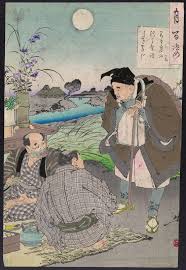The Pine Islands, Marion Posachmann
The old pond-
a frog jumps in,
sound of water.
(Basho, trans. Robert Haas)
The islands of Matsushima, "the most beautiful place in Japan," have attracted poets and novelists and painters and monks and ordinary persons seeking tranquility since the beginning of time.
Eight hundred years ago Basho, among the most notable of Japanese poets, journeyed to the far north of Japan to see the islands of Matsushima.
"The months and days are the travelers of eternity. The years that come and go are also voyagers. Those who float away their lives on ships or who grow old leading horses are forever journeying, and their homes are wherever their travels take them. Many of the men of old died on the road, and I too for years past have been stirred by the sight of a solitary cloud drifting with the wind to ceaseless thoughts of roaming.
Last year I spent wandering along the coast. In autumn I returned to my cottage on the river and swept away the cobwebs. Gradually the year drew to its close. When spring came and there was mist in the air, I thought of crossing the Barrier of Shirakawa into Oku. I seemed to be possessed by the spirits of wanderlust, and they all deprived me of my senses. The guardian spirits of the road beckoned, and I could not settle down to work." Basho (trans. Donald Keene)
Marion Poschmann, a highly regarded German novelist whose work, until now, has been unknown to me, uses Basho's "narrow road to the deep north" in order to frame a contemporary fable of self-discovery.
Gilbert Silvester, an academic whose intellectual preoccupation is beards in film and history, is propelled by a dream of his wife's infidelity to pack a small valise (toothbrush, change of underwear) and leave his home in Germany to fly to Tokyo. In the airport he purchases a copy of Basho's classic account of his journey to the far north, as well as Genji and the Pillow Book of Sei Shonagon. Browsing these volumes, with no plan and no apparent motive, Silvester is moved to retrace Basho's steps--to journey alone to the far north, to see the islands of Matsushima and find the sort of "inner peace" that in the West is equated with the diminution of the ego's cravings, a negative and, for the most part, fruitless endeavor.
Quite by accident Silvester's path crosses that of a young Japanese man who, nearly alone among his countryman, has a small beard: "The young man fussed around the bag and then finally seemed to reach a fragile but satisfactory state for the moment. He took a step back to admire his work and it was only then that Gilbert realized what it was about the man that had irked him. He had a small goatee beard: trendy, neat. Gilbert Silvester decided to speak to him." (26) An awkward plot device I suppose, but this is, after all, a book about impulses accepted and rejected, so why not bring two people together over the matter of beards?
Yosa Tamagotchi is a student who intends on killing himself "because he was afraid he wasn't going to pass his exams." Gilbert thoughtfully (?) suggests that jumping in front of a train may not be the most aesthetically pleasing way to commit self-slaughter, and convinces Yosa to accompany him on a journey in search of the ideal spot for self-destruction or, in Gilbert's case, ego-destruction. Yosa agrees, is agreeable, and, for the most part, is moved about like a puppet on strings, a projection of one corner of Gilbert's impulses.
And so we have in The Pine Islands what amounts to a buddy novel, a road trip (on trains) in search of Basho, the wisdom of no-self, and a pretty spot for suicide. It's an odd premise, and I was skeptical at first, but Poschmann pulls it off: the novel is full of pretty writing, and as the two men make their way, haltingly, toward the islands of Matsushima, the absurdity of what they are about gradually washes away. I didn't much care what would happen, since the events were besides the point, but I did relish the way Poschmann turned prose into poetry, the ordinary into the mystical.
Throughout, Gilbert writes cryptic messages back home to his abandoned wife and begins to sound a bit like a Buddhist monk. Yosa, whom we know only through Silvester's observations, rejects one suicide spot after another, mostly based on criteria established by his German mentor (too crass, too crowded) and we begin to think he might live after all.
Eventually the two travelers are separated, as we knew they must be, for this is ultimately a novel about living, and Gilbert's quixotic search for a better self could only be completed alone. The novel is full of anti-climaxes, but the final pages are so beautifully written that we don't mind at all that the whole thing feels like a half-baked fable intended to buck up unhappy Europeans (and now, with this translation, unhappy Americans) with the hope that by taking a long walk, carrying only a change of underwear, we too can find beauty, write poignant poems, and, just maybe, recover the lives we've squandered.
The Pine Islands, translated by Jen Calleja, is published by Serpent's Tail Press; it was shortlisted for the Mann Booker Prize in 2019, takes about two hours to read, and is worth every minute of your time.
George Ovitt (10/11/2019)


